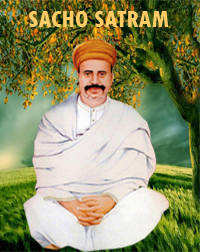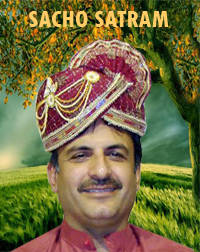On the occasion of a devotee’s wedding, Hazir Swaroop Sai Sadhram Saheb lovingly explained the beauty of our soulful connection with all.
Hazir Swaroop Sai Sadhram Saheb said that among all joyous occasions, a wedding brings immense happiness, which is shared with everyone. It is a time of togetherness and an opportunity to support one another.
On this pious occasion, family members share their happiness with the poor and needy by serving them food, engaging in selfless service, and providing financial assistance to those in need. Many go to great lengths to contribute through charity, extending help to the elderly, underprivileged, and needy on a large scale.
During the wedding rituals, parents also place photographs of their great-grandparents to seek their blessings and invite saints, mahatmas, and esteemed spiritual masters to grace the occasion. This reflects their intent to include as many as possible and receive everyone’s blessings. Additionally, as part of the wedding rituals, people extend their kindness to birds and animals, serving them with love and care.
Saijan said that to truly experience joy and share laughter, we need someone by our side. Likewise, in times of sorrow, we seek a comforting shoulder to lean on. A newlywed couple is guided to understand that in their journey ahead, they should remain connected with everyone—friends, relatives, neighbors, and other acquaintances. Living in isolation does not bring true happiness or prosperity. Staying together and maintaining connections not only enhances joy but also provides support during challenging times.
All those who supported the newlyweds during their struggles and growth, who always prayed for them, wished for their happiness, dreamt of their togetherness, participated in the wedding rituals, and put in efforts to manage the celebrations, deserve respect and care in the future.
Saijan said that we humans clearly understand that we are not only interconnected with one another but also deeply connected with the whole of nature. If someone claims they can live entirely on their own without any support, they overlook the countless external factors and resources essential for a better life.
Saijan explained this with an example. He said that even to eat a single chapati, numerous resources and efforts are involved. The wheat is grown in fields, then harvested and cleaned through multiple processes. It is transported to storage facilities, then to wholesale markets, followed by retail shops. From there, it goes for grinding into flour, which is further distributed to stores. Finally, we buy the flour, someone kneads the dough, and another person rolls and cooks the chapati. Countless hands and processes contribute to the making of just one roti.
Saijan explained that, just like in the making of a single chapati, our lives also rely on countless resources and sources. Since we are all interdependent and interconnected in this universe, we must treat everyone and everything with respect. Nurturing our connections with kindness and respect brings joy and prosperity into our lives.
our well-being and growth flourish when everyone in our lives remains harmoniously connected.
A wedding also symbolizes the significance of togetherness, as two individuals unite for a lifetime. While one person stands alone, two together become much stronger and more capable. As husband and wife, they join forces to progress further and achieve greater success in every endeavor.
Nowadays, due to various factors, the system of joint families has diminished, giving rise to nuclear families. Children who once received attention and support from extended family members now rely solely on their parents’ supervision.
As both parents often work, their role in raising children has become even more critical, making it challenging to provide proper upbringing. This lack of time has widened the gap between parents, their children, and their extended relatives.
Inviting relatives, friends, and associates to wedding celebrations highlights the importance of togetherness and reinforces the value of community support.
When children are born, both husband and wife take on different roles in raising them. Women, with their innate love, care, and immense patience, nurture their children into wonderful human beings with strong moral values.
Hazir Swaroop Sai Sadhram Saheb said that women possess extraordinary strength in shaping the future by raising powerful children. It is women who bring forth kings who go on to rule the world.
Saijan expressed concern that, in today’s times, children are exposed to mobile phones and social media at a very tender age, which affects their upbringing. One of the main reasons for this is that both men and women are now engaged in work. However, even in earlier times, both parents worked, yet they managed to give quality time to their children because such distractions were not as prevalent. History has seen great women rulers who not only led with wisdom but also raised remarkable children.
Saijan emphasized that a woman possesses greater strength, patience, sensibility, and affection, along with the ability to multitask successfully. With these qualities, she can nurture her children exceptionally well. However, if a woman underestimates herself and prioritizes other matters over her children, they may not grow up to be strong and wise.
To nurture responsible and strong individuals, it is essential to invest quality time in children, shield them from unnecessary exposure, encourage physical activities, and take them out to explore the world, science, and nature. The need of the hour is to spend more time with children with great patience, offering them real-life experiences suited to their age. Both husband and wife play a crucial role in raising strong, value-driven children who can face life’s challenges with courage and integrity.
Parents may face serious consequences and risk ruining not only their own lives but also the lives of their children if they fail to give them proper attention.
Nowadays, children spend most of their time watching cartoons and playing games on their phones and tablets, which has led to unusual behavioral changes. These days, many children are experiencing depression. An increasing number of children are being born with speech and other disabilities .They are not utilizing their brain’s full potential; in fact, they rarely engage their minds in a positive way.
The human mind is incredibly powerful and has immense capacity, yet, unfortunately, we do not use it effectively.
Due to a lack of awareness and understanding, we have begun distancing ourselves from others. We have developed a habit of complaining about one another and constantly blaming others for our hardships and difficulties.
Saijan reminded us that a wedding is an occasion of unity. We invite everyone because it is not just the union of the bride and groom but also a moment that brings together all those connected to their families. A wedding symbolizes the importance and strength of unity.
Similarly, just as various elements in nature must come together to make a single chapati, true unity brings its benefits only when everything is interconnected and in harmony.
Instead of uniting out of compulsion, true joy is found in uniting willingly with happiness.
A wedding signifies that the couple getting married has the support of their relatives, friends, society, neighbors, and all those connected to them, showcasing the immense strength of their collective bond.
Hazir Swaroop Sai Sadhram explained that living together in harmony has many benefits. It promotes good health, fosters progress, and leads to success.
Being surrounded by others helps prevent the difficulties of depression and loneliness, allowing everyone to live happily together. When people stay connected, they support one another through both joys and sorrows.



